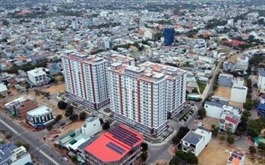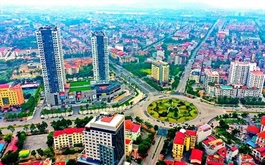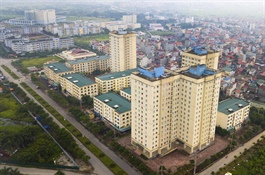Hospitality industry looks to level up
Hospitality industry looks to level up
Savills Hotels, in partnership with WeHub, hosted a Meet The Experts event in Ho Chi Minh City on March 30. More than 40 speakers held lively discussions with international developers, hotel owners, and professionals while the industry's performance was reviewed and market prospects were discussed.
“Vietnam’s hospitality market had great momentum before the pandemic, moving from a destination only for experienced travellers, to a place for holiday and leisure travellers. It rivalled international travel hubs like Thailand, thanks to the joint efforts from many industry players,” said Mauro Gasparotti, director of Savills Hotels in the opening presentation on the challenges and opportunities of the industry this year.
“However, development outpaced demand, and now we are dealing with the consequences of over development, with incomplete or underperforming projects. The market needs time to readjust. On a positive note, several high-quality hotels and resorts in the country are doing exceptionally well, and they will keep doing so for the foreseeable future. Projects that have been properly implemented and are correctly managed will recover faster,” he added.
"Development outpaced demand, and now we are dealing with the consequences of over development, with incomplete or underperforming projects. The market needs time to readjust. On a positive note, several high-quality hotels and resorts in the country are doing exceptionally well, and they will keep doing so for the foreseeable future. Projects that have been properly implemented and are correctly managed will recover faster," Mauro Gasparotti, director of Savills Hotels.
Industry insiders remarked that tourism faces difficulties such as inflation, global political tensions, raised airfares and labour shortages. In the view of many, recovery is fragmented. Ho Chi Minh City has experienced significant recovery, with occupancy fast reaching 2019 levels. However, properties in Nha Trang and Danang are still struggling to improve performance. Operating margins in these areas are 40 to 60 per cent lower than those in Bali and Phuket.
According to Fenady Uriarte, of hotel industry analysts STR, Southeast Asia’s revenue per available room (RevPAR) for February 2023 moved closer to 2019's -3.6 per cent, but Vietnam’s overall RevPAR is still -33.4 per cent. "The average daily rate is moving in the right direction. As we look ahead, key source markets reopening, such as China and Japan, could present an upside for Vietnam,” she said.
Many hotel developments are delayed or on hold because of tightened credit controls. However, the conversion of existing developments shows that many hotel owners are looking to collaborate with chain brands. Owners of independent hotels and chains are increasingly attracted to the opportunity to benefit from the scale, expertise, and network of global hotel operators.
At present, classic hotel brands dominate in Vietnam. According to Bryan Chan, senior director of development of IHG Hotels & Resorts in Southeast Asia and Korea, more lifestyle brands are expected, including Voco, Hyde, Hotel Indigo, Caption by Hyatt, L7 and Garrya. New types of travellers are emerging who focus on their overall experience and have higher expectations, which has fuelled the rise of lifestyle hotels.
Millennials make up 30 per cent of Vietnam’s population and are shaping the travel landscape. Norbert Vas, COO of Archipelago Indochina, said, “I am both concerned and optimistic about this sector in Vietnam. Concerned about where big operators are taking the concept, but optimistic because there is vast local talent and creativity with a burgeoning young domestic class of sophisticated travellers who would gladly embrace the lifestyle concept if executed correctly.”
Speakers from QUO Global, Dulux Professional, IHG Hotels & Resorts, SOHO Hospitality and Delivering Asia Communications discussed the latest industry movements such as colour trends, hotel conversion, luxury dining, and the power of branding and media communications.
Furthermore, industry experts and senior professionals from Savills Vietnam, Lodgis Hospitality Holdings, Swiss-Belhotel International, TCC Land International (Thailand), Tanzanite International, Baker McKenzie, Brand & Co and EuroStyle explored branded residences and ultra-luxury dynamics. In the next three years, forecasts expect significant growth in the luxury hotel segment. While luxury rooms currently have 2 per cent of the total supply, they have 5 per cent of the pipeline.
In the next three years, forecasts expect significant growth in the luxury hotel segment. While luxury rooms currently have 2 per cent of the total supply, they have 5 per cent of the pipeline.
Luxury branded residences are increasingly popular in Vietnam. International property branding expert Anthony Moulton, managing director at Brand & Co, said, “Time and space are the new hallmarks of luxury,” adding that, "prestige and status are still the two largest factors that make people buy luxury branded residences and luxury goods."
Peter Mach, managing partner of Tanzanite International, discussed whether a distressed market will push up the volume of deals done in 2023. "In the luxury segment for residential housing or hotels, owners don’t sell their crown jewel assets at distressed prices. Many of the wealthy owners still have money and access to liquidity, so they don’t need to sell," he said, adding that buyers in the luxury segment are more demanding, and can buy in good times and bad, when the price is right and the product meets their desires.
On another note, hotels are reshaping the look, feel and appeal of their properties, using exterior and interior designs to create unique experiences.
The representative from Vietceramics said, “Higher guest expectations have motivated Vietceramics to provide innovative solutions for interior building materials, sourced from our globally renowned partners. Thanks to groundbreaking manufacturing techniques, our tile and sanitary ware collections could satisfy exceptional aesthetics requirements."
Nguyen My Lan, general director of AkzoNobel Vietnam, said “Eco-friendly architecture is an inevitable global trend. This year, AkzoNobel has partnered with Savills Hotels to share and contribute to the development of sustainable solutions for the industry."


























